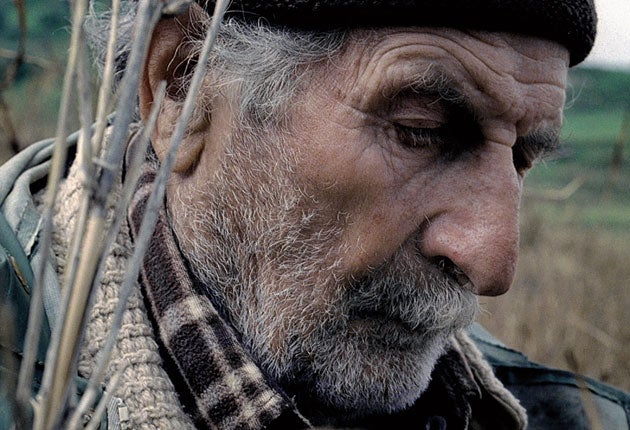Le Quattro Volte, Michelangelo Frammartino, 88 mins, U
Slow Italian art cinema might not set the pulse racing, but be patient: with barely a word of dialogue, this gentle drama is beautiful, mysterious and funny

The ever-elusive Terrence Malick managed to conquered Cannes last week with his grandiose testament The Tree of Life – a film that mused on Creation, Grace and The Meaning of It All, taking in volcanoes, dinosaurs and an eerie sheaf of light that might have been either the Holy Ghost or some sub-atomic anomaly inside the Large Hadron Collider.
The film registered a full 11 on the Shock and Awe scale, but it wasn't to my taste: I like to think that it's possible for cinema to make profound cosmological statements without having to go all Cecil B DeMille.
In fact, such a feat is achieved by a new Italian film that's both magnificent and magnificently economical. Michelangelo Frammartino's Le Quattro Volte will set you musing on matters natural and metaphysical, using little more than some Calabrian hillsides, a stack of logs, some snails and a herd of goats – and barely a syllable of dialogue. The film is an extraordinary achievement – beautiful, moving, mysterious, and, at times, extremely funny. In its self-effacing way, it's nothing short of a miracle – one of those rare works that break all the rules about what cinema "should" be in order to demonstrate what it can be.
Le Quattro Volte doesn't have a narrative in the familiar sense. It starts out resembling a documentary about life in Calabria, in the region around a hilltop town. It all begins with a mysterious thumping, like a heartbeat, and it is indeed the heartbeat of the region – the sound of workmen bashing the air out of a "scarazzo", a traditional structure of logs used to burn charcoal.
Soon after, we meet an ancient goatherd (Giuseppe Fuda) who daily leads his herd into the hills to graze. The old man has a bad cough, and treats it with a dubious placebo – dust collected in the local church. One day he mislays his packet of dust, with terrible results. I won't tell you what those consequences are, but they trigger the most extraordinary sight gag I've seen for a long time. It involves a truck, a restless dog and an Easter parade containing several Roman centurions – and of course, the goats. The sequence – running some eight minutes, all in a single take – is so meticulously achieved that it's not only hilarious, it's also breathtaking, a sort of ballet without dance and one of the marvels of recent cinema.
Soon afterwards, Frammartino cuts to the birth of a kid goat. He follows the animal's "apprenticeship" – exploring the goat shed, playing "King of the Castle" with its peers, then heading out to explore the wide world. If this suggests Disney anthropomorphism, that's far from the truth, but Frammartino certainly does something unusual in offering us a goat's eye view of the world. This section also has an ending that's poignant, perhaps even tragic, although we never learn its outcome for sure.
It's one thing to make us empathise with a goat, but Frammartino achieves something truly extraordinary when – purely through editing and camera work – he makes us identify first a tree, then its stripped trunk, then the resulting pile of logs as also somehow being incarnations of the film's protean "hero".
The title – literally, the four "turns"or "phases" – refers to the world as described by Pythagorean philosophy, with its theory of a cycle of eternal transformation and reincarnation. What this means in practice is that Le Quattro Volte isn't about story, or character, or even action. Rather, this is a contemplative film about things changing into other things – like trees into logs into smoke – and about the cycle of natural changes, the internal clock by which the universe keeps time. The film has something in common with the once-fashionable Italian school of back-to-the-earth cinema exemplified by the Taviani brothers' 1977 peasant drama Padre Padrone. But Le Quattro Volte also smacks deliciously of Jacques Tati's deadpan comedy – and when the goats are on screen, you can't help thinking of Chaplin or the Marx Brothers, such is these creatures' natural anarchic genius.
Le Quattro Volte is the freshest and the deepest film I've encountered in a while. It's one of those rare films that anyone could enjoy, whether or not they normally care for slow Italian art cinema. I suspect that children would enjoy it, the more patient kind at least – although they should be prepared for a Bambi-style sob or two. This is an extraordinary film in every way – not to mention the best goat film ever. So you'll excuse me if I repeat the line I used this time last year, when the film was the revelation of Cannes 2010 – Le Quattro Volte is, quite simply, a maa-sterpiece.

Watch Apple TV+ free for 7 days
New subscribers only. £8.99/mo. after free trial. Plan auto-renews until cancelled

Watch Apple TV+ free for 7 days
New subscribers only. £8.99/mo. after free trial. Plan auto-renews until cancelled
Next Week
Jonathan Romney watches Gérard Depardieu let it all hang out in his road movie Mammuth
Film Choice
Paul Giamatti does his all-American loser routine to immaculate effect in Win Win a new recession comedy from director Thomas McCarthy, of The Station Agent (2003) fame. Plus 1979 classic Apocalypse Now returns – the original cut, not the 'Redux' expansion – in a restored version that gives you the horror, afresh.
Subscribe to Independent Premium to bookmark this article
Want to bookmark your favourite articles and stories to read or reference later? Start your Independent Premium subscription today.

Join our commenting forum
Join thought-provoking conversations, follow other Independent readers and see their replies